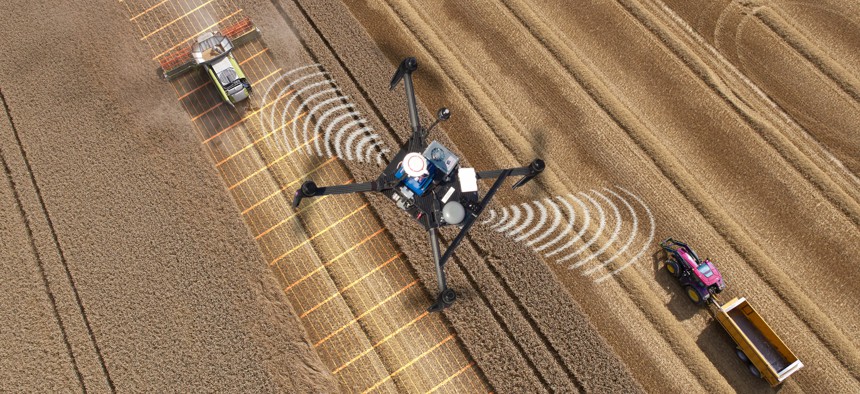How one state jockeys for drone, AV leadership

Richard Newstead/Getty Images
The Arkansas Council on Future Mobility called on the state to capitalize on the rapidly changing mobility landscape by investing in its tech infrastructure and workforce.
Arkansas can be a “global leader” in mobility if it works to bolster emerging technologies like drones and autonomous vehicles, invests in its workforce and collaborates with other states, according to a new report from Gov. Asa Hutchinson’s Arkansas Council on Future Mobility.
The council, composed of private- and public-sector and academic leaders, spent 10 months working on the strategy. The plan shows the need to “take a thoughtful, strategic approach” to growing the industry, Hutchinson said in a statement.
In a series of recommendations for state lawmakers and other officials, the group said Arkansas should keep expanding its drone delivery services, including by partnering with companies to provide health care services to rural communities. The council also recommended that the state increase its use of drone technology to inspect infrastructure, an effort that is already popular nationwide and gathering momentum.
In addition, the report urged the state to continue to be at the “forefront” of autonomous vehicles, by calling for the Arkansas Department of Transportation to build and maintain a structured database containing real-time information on construction zones, traffic light timings, roadway changes and other relevant data that AV innovators can use. The council also pressed the state to ensure strong wireless network coverage to support the integration of sensors into public spaces.
For even more innovative transportation technology, the report advised Arkansas to “proactively support” organizations that are installing infrastructure for advanced air mobility systems that can take off and land vertically and carry goods and people. It also advocated for the creation of a statewide Arkansas Space Authority to support a local space transportation industry.
Beyond urging support for various transportation methods — an effort that also touched micromobility and electric vehicles — the council said it is critical the state invest in its workforce and academic development to shore up these future mobility methods.
Arkansas’ K-12 schools and community colleges should expand STEM education, the council said, as it anticipates mobility to require “significant focus” in the fields of engineering, computer science, robotics, data science, artificial intelligence/machine learning, cybersecurity, programming and software development.
To do that, the report called for increased investment across all grade levels and in teacher pay. High school students should have access to three-year programs of study in a variety of computer science pathways that relate to advanced mobility.
Additionally, the University of Arkansas should create an Institute for Advanced Mobility, and the council urged local leaders to “proactively” recruit tech-savvy Arkansans who have left the state to “return home.”
Finally, the council called for Arkansas to be open to cross-state initiatives with regional partners, citing the success of the interstate highway system as “the epitome” of regional progress.The “impact of transportation knows no borders,” the report stated.
The council noted a memorandum of understanding signed between Arkansas and Oklahoma to develop the region into a “national hub for advanced mobility,” as well as a separate partnership with Louisiana and Oklahoma for a regional hub for the development, production and utilization of hydrogen energy. A similar smart city partnership has already been undertaken between the nonprofit North Texas Innovation Alliance and Peachtree Corners, Georgia.
Arkansas should “double down” on those existing regional partnerships, the report said, and it should consider launching new ones with Texas and Tennessee, noting that the combined entity could serve as a national “Super Hub” for mobility.






